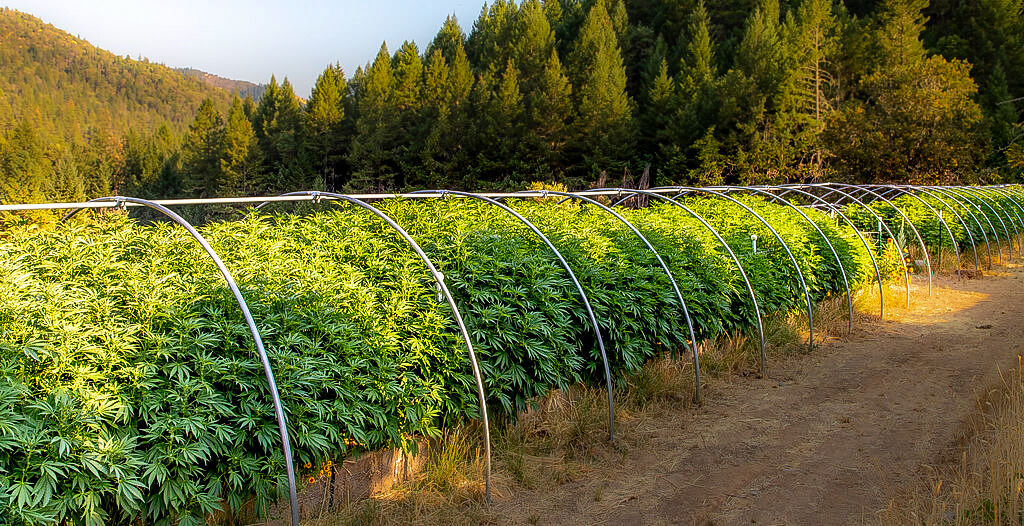by Ryan McGuire, HK Cannabis Law
On October 29, 2019, the USDA released regulations establishing a domestic hemp production program, paving the way for hemp cultivation on an industrial scale in 2020. While the potential benefits of a robust hemp industry in California are exciting, large scale industrial hemp cultivation increases the risk of cross-pollination for hemp and cannabis growers, which may significantly impact the value of both crops.
Cannabis sativa, the plant used in both hemp and cannabis production, is a dioecious species, meaning that male and female flowers are borne on separate plants. Cannabinoids, including THC and CBD, are more concentrated in the female flower than in the male flower. Therefore, cannabis or hemp growers who desire a crop with a high yield and potency of either THC or CBD will typically use feminized seeds or clones and will weed out male plants if they appear. Growers of industrial hemp produced for seed or for fiber, however, are not concerned with producing potent cannabinoids and therefore will generally grow both male and female plants.
Cross-pollination between female and male plants can cause problems, such as seed production, lower crop yields, and altered THC or CBD content of the flowers that are produced. This can devastate the value of crops grown for their THC or CBD content. Moreover, if hemp exceeds the 0.3% THC concentration threshold allowed under the federal regulations, it must be destroyed.
Unfortunately, cannabis pollination can occur over large distances depending on the concentration of plants and weather conditions. Industry experts recommend a minimum distance of ten miles between outdoor growing operations, but research shows it is possible for cannabis pollen to travel much further. Therefore, cross-pollination is possible even if a neighboring farm is miles away. This dynamic poses a huge problem to the young industry.
At this point, there are few regulations in California designed to prevent cross-pollination. Several counties enacted temporary moratoriums on the production of hemp, primarily based on the USDA’s inaction. In those counties, cross-pollination has not been a problem since cultivation was not allowed in the first place. Now that the USDA has issued regulations governing the hemp industry generally, counties will likely lift these temporary moratoriums. But since the USDA regulations are silent as to the distance between hemp and cannabis operations, cross-pollination will almost certainly occur and will likely result in litigation in the near future. Indeed, cross-pollination has already caused litigation in other states. For example, lawsuits related to cross-pollination have already commenced in Oregon. In Jack Hempcine LLC v. Leo Mulkey Inc., et. al., a hemp grower alleges that cross-pollination by male plants on the property of several nearby growing operations raised the THC levels of the Plaintiff’s female plants, rendering his entire crop unmarketable. The grower who brought that action alleges damages exceeding $8,000,000 in lost crop value.
There are several legal theories available to growers seeking to recover damages caused by cross-pollination of their crop by a nearby hemp or cannabis operation, including negligence, trespass, nuisance, strict liability, and interference with prospective economic advantage. If your crop is or was negatively affected by cross-pollination or another grower alleged that you have damaged their crops via cross-pollination, you should contact counsel as soon as possible.
 Ryan McGuire is an attorney at HK Cannabis Law, a practice group of Huguenin Kahn LLP, a full-service law firm representing clients throughout California and beyond. Ryan has years of experience litigating a broad range of legal actions, including personal injury, employment, contractual disputes, and construction defect claims. Ryan also has deep ties to California’s agricultural community, and has successfully represented growers, packers, and distributors. Ryan’s knowledge and experience are valuable assets for clients involved all aspects of cannabis production from seed to sale. Established to provide legal representation and counsel in the emerging field of cannabis law, HK Cannabis Law stands ready to serve clients at every stage of the cannabis business cycle, from business entity formation, real estate acquisition, land use, contracts, business transactions, regulatory compliance, licensing and permitting, enforcement defense and, should it ever be necessary, legal representation in both civil and criminal trials and appeals.
Ryan McGuire is an attorney at HK Cannabis Law, a practice group of Huguenin Kahn LLP, a full-service law firm representing clients throughout California and beyond. Ryan has years of experience litigating a broad range of legal actions, including personal injury, employment, contractual disputes, and construction defect claims. Ryan also has deep ties to California’s agricultural community, and has successfully represented growers, packers, and distributors. Ryan’s knowledge and experience are valuable assets for clients involved all aspects of cannabis production from seed to sale. Established to provide legal representation and counsel in the emerging field of cannabis law, HK Cannabis Law stands ready to serve clients at every stage of the cannabis business cycle, from business entity formation, real estate acquisition, land use, contracts, business transactions, regulatory compliance, licensing and permitting, enforcement defense and, should it ever be necessary, legal representation in both civil and criminal trials and appeals.


Follow NCIA
Newsletter
Facebook
Twitter
LinkedIn
Instagram
–